UK drinking and alcohol laws guide: How to get an alcohol licence
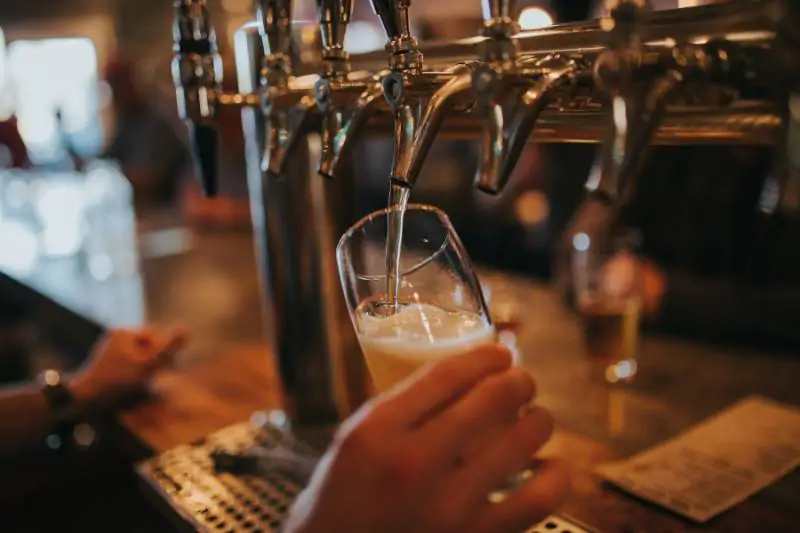

If you’re opening a bar, pub, restaurant, or any other type of hospitality establishment where you intend to sell alcohol, you’ll first need a good understanding of alcohol selling and drinking laws in the UK. Following the laws and regulations set out in The Licensing Act 2003 for England and Wales (or The 2005 Act in Scotland or The Licensing and Registration of Clubs Act in Northern Ireland) is vital for both the safety of your customers and the viability of your business.
But what exactly are the alcohol selling laws in the UK, and how can you ensure your business is following them strictly? In this guide we’ll cover everything you need to know about legally selling alcohol as a hospitality business in the UK, from UK drinking laws in each of the four nations to the cost of an alcohol licence and how you can acquire one.
Alcohol laws in the UK: Frequently asked questions
- What are licensed hours?
- How old do you have to be to serve alcohol?
- What is the legal age to drink in the UK?
- What are the laws on bringing your own alcohol in the UK?
- What are the laws around alcohol measurements?
- What are the pricing and promotion laws when selling alcohol in the UK?
- What are the laws on having children in your establishment if serving alcohol?
- Is provision of free water a legal right?
Alcohol laws in the UK: Frequently asked questions
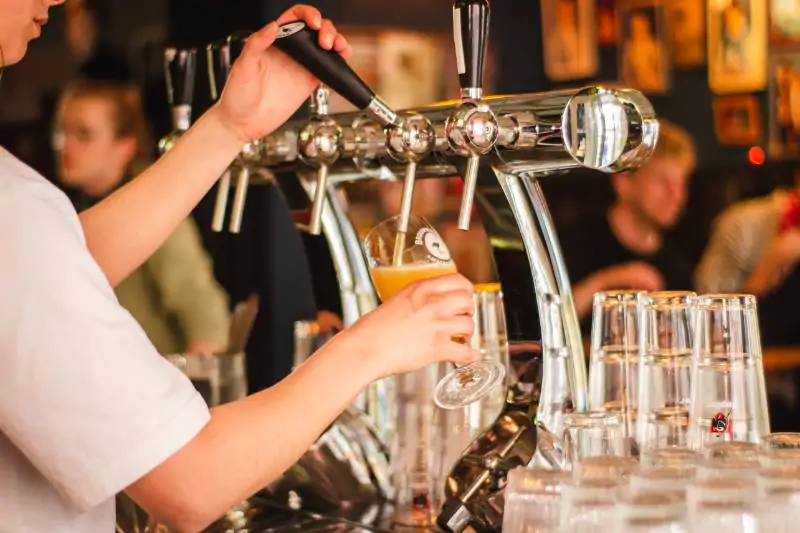

When it comes to alcohol laws in the UK, there is a lot of essential information for owners of hospitality businesses to know. Here, we’ll cover some frequently asked questions on UK drinking laws, so you have all the information you need before applying for an alcohol licence.
What are licensed hours?
When it comes to what time you can buy alcohol in the UK, this depends on a number of factors so there is no one answer. In England and Wales, your licensed hours depend on the conditions set out in your alcohol licence, so you should always make sure your opening hours fall within this agreed -upon time frame. However in general, most pub opening hours in England and Wales begin from around 11am and closing time is around 10pm – 11pm, while for bars and clubs these hours may extend to 2am – 5am. Although becoming increasingly rare, some on-licence premises still have 24-hour alcohol licences (GOV.UK). During times of national celebration, such as a Coronation, you may be granted a relaxation of opening hours under The Licensing Act 2003.
In Scotland, alcohol laws are generally more restrictive than those in the UK and Wales, but in the case of licensed hours, these also depend solely on the hours stated in your licence. General opening hours are roughly the same as those in England and Wales, too, although 24-hour licences are even rarer.
In Northern Ireland, those with a licence must only sell alcohol within the following periods:
- Monday – Saturday: 11:30am – 11pm
- Sunday: 12:30pm – 11pm
- Christmas Day: 12:30pm – 10pm
However, hospitality businesses that provide accommodation are exempt from these rules when selling alcohol to those staying overnight in their establishment. In this case, alcohol can be sold to the customer at any time.
How old do you have to be to serve alcohol?
The good news for those in England, Wales, and Northern Ireland with a young hospitality team or those looking to expand their workforce is that employees aged 16 and 17 are able to work in a licensed establishment and serve alcohol. However, this transaction must always first be approved and supervised by another employee aged 18 or over.
The licensing laws in Scotland are slightly different, however. People aged 16 and 17 cannot work in a bar or pub that doesn’t sell food. However, you can serve alcohol under 18 as one of the wait staff if the drink is purchased alongside a meal, as long as your employee is 16 or over and the transaction is approved and supervised by another adult employee.
What is the legal age to drink in the UK?
We all know that in every circumstance, the legal age to buy alcohol in the UK is 18. However, it is legal to serve alcohol to those aged 16 and 17 in specific circumstances. Teenagers this age are allowed to drink beer, wine, or cider in a pub or restaurant as long as the beverage is served alongside a meal and is purchased by someone aged 18 or over. This drinking law applies in all four nations of the UK.
What are the laws on bringing your own alcohol in the UK?
An alcohol licence is always required by hospitality establishments when serving alcohol to customers. But if you have a bring your own bottle policy, no licence is required in England, Scotland, Wales, or Northern Ireland. However, it is the responsibility of the business to ensure that customers are behaving in an orderly and respectful manner, as you can be prosecuted for the drunkenness and disorderly conduct of your patrons.
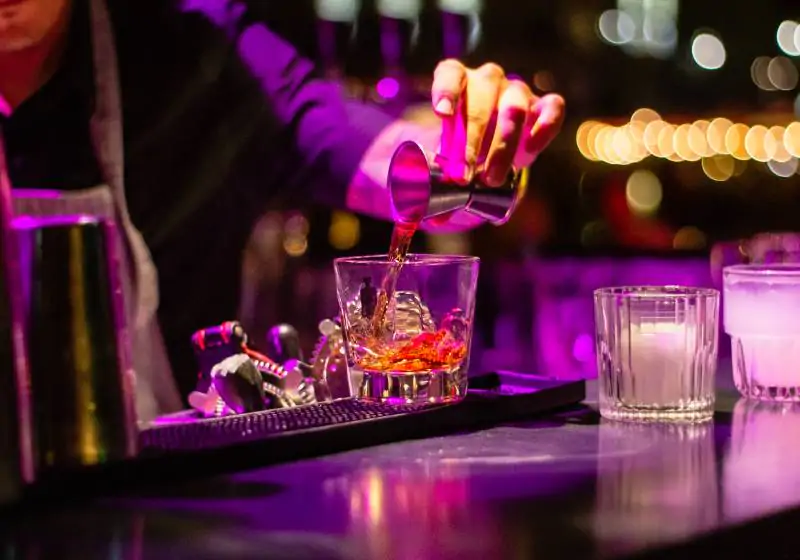

What are the laws around alcohol measurements?
Under the UK Weights and Measures Act 1985, alcohol measurements of some drinks must fall within certain amounts. Below are the permitted measurements for the drinks covered by this law:
- Shot measurements in the UK for vodka, gin, whisky, and rum: 25ml or multiples of 25ml, or 35ml or multiples of 35ml — once you’ve decided on your preference, you must stick to this measurement type on all four of these spirits served in your establishment.
- Port, sherry, and fortified wine measurements in the UK: 50ml, 70ml, and multiples.
- Still wine measurements in the UK: 125ml, 175ml, and multiples.
- Draught beer and cider measurements in the UK: Third pints, half pints, two-third pints, and multiples of half pints.
This alcohol law also covers some packaged drinks. Below are the minimum and maximum volumes of packaged alcoholic drinks permitted to be sold under the Weights and Measures Act:
- Fortified wines: Minimum of 100ml volume and maximum of 1500ml.
- Still wine: Minimum of 100ml volume and maximum of 1500ml.
- Sparkling wine: Minimum of 125ml volume and maximum of 1500ml.
- Spirit based drinks: Minimum of 100ml volume and maximum of 2000ml.
As you can see from the above, not every drink is covered by both parts of this law. For example, there are no restrictions for the volume of packaged beers and ciders, and sparkling wine served by the glass isn’t covered by these regulations. Sprits other than vodka, gin, whisky, and rum also aren’t covered by this law.
To ensure your hospitality business is always serving the right measurements, make sure to check out Mitchell & Cooper’s selection of spirit measures, including spirit pourers and thimble measures, with markings to make sure you’re getting the most accurate pour every time. If you’re looking to find the right option for your business, you may be interested in our review of The Easy Jigger.
What are the pricing and promotion laws when selling alcohol in the UK?
One of the less known UK alcohol laws is the ban on irresponsible drinks promotions. This law has been in place since the 2003 Licensing Act in England and Wales, but has been tightened over the years for the safety of consumers. Some of the examples of irresponsible promotion set out under the 2014 Guidance on Mandatory Licensing Conditions include:
- Drinking games or activities designed to encourage alcohol consumption in a certain time limit
- Unlimited alcohol for free within a certain time limit
- Rewards for alcohol consumption
- Promotional posters which can be considered to glamourise anti-social behaviour or drunkenness
- Dispensing alcohol directly into the mouth (not applicable in the case of a customer with a disability who is unable to drink without assistance)
Scottish hospitality establishments that serve alcohol are covered by a similar set of regulations in the Licensing Act of 2005. There are a number of examples of promotions which fall under the irresponsible drinks promotions criteria in this Act, including:
- Promotion of a drink made to appeal to under-18s
- Encouraging customers to buy and consume a larger quantity of alcohol than they initially intended
- Rewards for alcohol consumption
- Offering alcohol as a prize, unless it is sealed packaged alcohol which is consumed off the premises
Like England, Wales, and Scotland, Northern Ireland has similar alcohol laws and regulations on irresponsible promotion. In 2011, the 1996 Licensing Order Act was expanded to ban a number of irresponsible drinks promotions, including:
- Promotions offering unlimited amounts of alcoholic drinks
- Alcohol for a reduced price when buying another alcoholic drink, such as buy one get one half price offers
- Promotions based on the strength of the drink
What are the laws on having children in your establishment if serving alcohol?
Many are unsure around UK alcohol laws when it comes to allowing children on your premises. Under the Licensing Act 2003 in England and Wales, it is an offence for an unaccompanied child under 16 to be allowed in an establishment which is primarily used as a place to consume alcohol. This includes clubs, and in many cases bars and pubs. If you have a permanent food menu and restaurant service in your establishment, then this law does not apply. However even if your hospitality business does serve a permanent food menu, it is illegal to have unaccompanied children in the building between midnight and 5am if alcohol is being served.
When it comes to children under the age of 16 accompanied by a legal adult, the law varies depending on your licence. With some licences, children are restricted staying past a certain time at night (often 9pm), including when accompanied by an adult. However, some establishments put this rule in place even when the regulation isn’t set out in their licence. Often, this is simply up to the business owner’s discretion. Scotland’s alcohol laws were once strict and prohibited children from entering pubs and other licensed establishments. But since the 2005 Act, Scottish establishments have been able to operate on a premises-by-premises basis, much like hospitality businesses in England and Wales.
Under Northern Ireland’s drinking laws however, there is slightly more restriction when it comes to children on licensed premises. In hospitality businesses in the country, a young person who is accompanied by an adult is allowed to be in the bar area (but not at the bar) until 9pm, or 10pm for sporting clubs. A young person is also allowed to stay on the premises until 9:30pm if they are still eating a meal that was ordered before 9pm.
Is provision of free water a legal right?
In England, Wales, and Scotland, it is mandatory to provide customers with free tap water upon request. There is no legal obligation to do so in Northern Ireland even in licensed businesses, although the vast majority of establishments will honour this request anyway.
Which alcohol licence do I need and how do you get one?
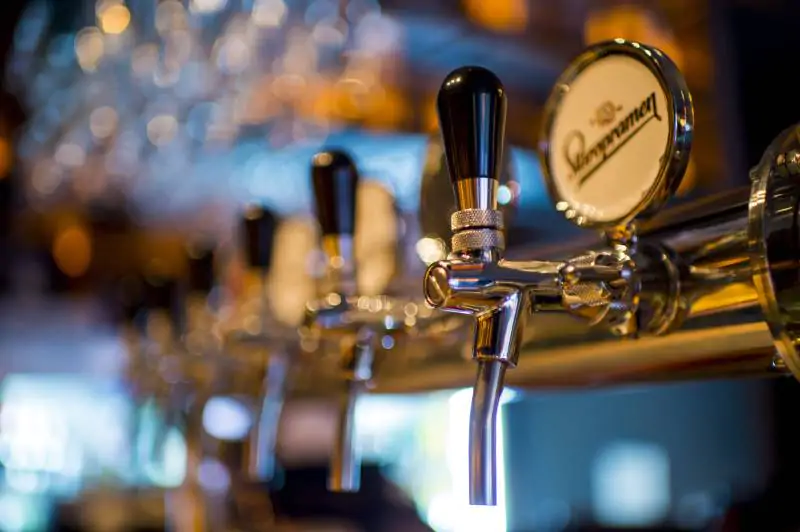

Now you have answer to some of the most frequently asked questions on alcohol and drinking laws in the UK, it’s time to look into the different types of licences and how to get an alcohol licence. The licence types and application processes vary throughout the UK. Below are the types of licences and application process in each country.
Alcohol licences in England and Wales
If you’re looking to get a licence to sell alcohol in England and Wales, there are three different types available:
- Premises licence: A premises licence allows you to sell alcohol from a particular premises — this includes moveable premises, such as food trucks[S1] . This licence also permits you to serve hot food and drinks between 11pm and 5am. The premises licence does not need to be renewed, but it can be revoked if you breach the regulations set out in The Licensing Act 2003.
- Personal licence: A personal licence holder can sell or authorise the sale of alcohol in a hospitality business with a premises licence. Your hospitality business must have at least one employee with a personal licence, whether this is you or a member of your staff. This licence does not need to be renewed, but the holder must notify their local Licensing Authority if they change their name and address.
- Temporary Events Notice (TEN) licence: A temporary events notice licence can be used for hosting large events where “licensable activity” will be carried out, including selling alcohol, providing entertainment, and serving hot food and drink between 11pm and 5am. With a personal licence, you can receive up to 50 TEN licences per year.
Applying for a premises licence
In order to apply for a premises licence, you must fill out a premises licence form on the GOV.UK website. The form requires information on your proof of entitlement to work in the UK, proposed opening hours, and the types of licensable activity you intend to take place on your premises. You should also provide a plan of your premises, making clear the boundaries of your premises, points of access, emergency escape routes, and clearly show the location where you will be selling alcohol and where it will be consumed.
When applying for a premises licence, you must also nominate a “designated premises supervisor” (DPS). Under UK licensing law, this should be the person who is responsible for the day-to-day running of your business. This also means they are the primary contact for police matters and for the local licensing authority. You may want this to be yourself, or if you own your business but are not the manager, you may wish to make the manager your DPS. If necessary, you can change your nominated DPS through a DPS variation form.
Applying for a personal licence
Applying for a personal licence requires a bit more work beforehand, as you first need to attain an accredited licensing qualification. You can find where you can get your qualification on GOV.UK’s list of accredited personal licence qualification providers. You must also not have had a personal licence revoked within the past five years if you want your application to be considered. Other requirements for your personal licence application include:
- Having a Disclosure & Barring Service (DBS) check, which checks your criminal record
- Having the right to work in the UK
- Being aged 18 or over
If you fit the criteria above, have had a DBS check, and hold the appropriate qualification, you can fill out the official personal licence application form. Fortunately, once you have gathered all the necessary information and your qualification, the form is relatively straightforward.
Applying for a Temporary Events Notice
The TEN application form differs from council to council. Many of them are relatively similar to the premises licence application. You will usually be asked to provide personal details, the details of your premises, and the licensable activity you intend on covering with the notice. You will likely also be asked about previous TEN licences and applications. In some cases, you may need to contact your local council directly for more information before applying for a TEN.
Alcohol licences in Scotland
The three types of alcohol licence in Scotland are similar to the ones in England and Wales:
- Premises licence: Like in England and Wales, a premises licence is required to sell alcohol on premises. To apply for this, you must nominate a designated premises manager (DPM), similar to the nomination of the designated premises supervisor in England and Wales.
- Personal licence: Again, just like in England and Wales, a personal licence holder can sell or authorise the sale of alcohol in a hospitality business with a premises licence. You must have a person in your business with a personal licence, and they must also be your DPM. In Scotland, you must renew your personal licence every ten years, and go on refresher training for your qualification every five.
- Occasional licence: The occasional licence is the Scottish equivalent of the TEN, and is used for those looking to serve alcohol temporarily at an event in an unlicensed Scottish premises.
Applying for Scottish licences
The application process for each three of these licences is similar to the process in England and Wales. In the Scottish premises licence application, you will need to provide the same personal information, details of the licensable activity, and layout of your premises, alongside a written statement on how your business will stick to the licensing objectives set out in The Act 2005.
The personal licence application in Scotland differs from council to council, but it will include most of the same information that is in an English form. You must also be over the age of 18, hold a licensing qualification, and not have a licence revoked within the past five years. The qualification required for this type of licence in Scotland is the Scottish Certificate for Personal Licence Holders (SCPLH).
Occasional licences also have similar application processes to those in England and Wales, although again this varies from council to council.
Alcohol licences in Northern Ireland
Alcohol laws operate differently in Northern Ireland compared to the rest of the UK. While you still need a licence to sell alcohol, personal licences don’t exist in the country. This means there are only two types of alcohol licences:
- Liquor licence: This is the licence you need if you want to permanently sell alcohol in your establishment.
- Occasional licence: Like in Scotland, Northern Ireland has an occasional licence, however they have different meanings. While in Scotland the occasional licence is for unlicensed premises, in Northern Ireland it is for those with a liquor licence who are looking to sell alcohol away from their usual premises, such as at a food festival. This licence is valid for up to six days.
Applying for Northern Irish licences
The application process for a liquor licence in Northern Ireland requires a lot more research and planning than one for a premises licence in Scotland, Wales, and England. You must apply for your liquor licence at your local county court. Beforehand, you are also required to display a notice of your intention to apply for a liquor licence on or near your premises, inform your local police station and district council three weeks (or more) prior, and publish a notice of your intention to apply for a liquor licence in two or more local papers at least two weeks before your application.
The application process itself is relatively thorough as well. You will be required to demonstrate that there is demand for your business in the area, among several other factors. Many applying for this licence opt to hire a solicitor to aid them in the process, from the planning to the court room.
Like the liquor licence application, for an occasional licence in Northern Ireland you will need to put your case forward in the local courts. Although this is typically less difficult to obtain than a liquor licence, it still requires plenty of research and planning.
How much is an alcohol licence in the UK?
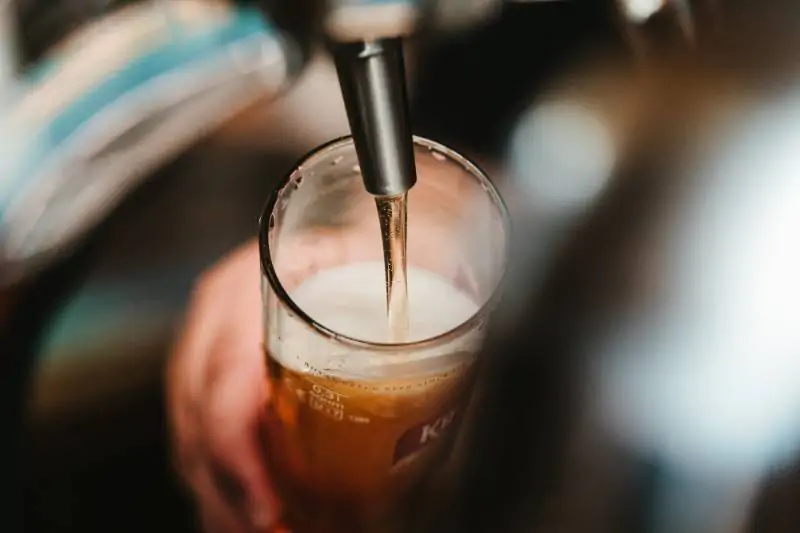

How much is an alcohol licence in England and Wales?
When applying for an alcohol licence, cost is no doubt one of your main concerns. Fortunately, in England and Wales the cost for a personal licence and TEN licence are very affordable. A TEN only costs £21, while a personal licence in England and Wales costs £37. If you lose your temporary event notice and need a replacement, or if the details of the personal licensee need to be updated, this will cost £10.50.
When it comes to the cost of a premises licence, the fees vary depending on the fee band of your venue. Below are the current fee bands for premises licences in England and Wales, for both the application and the annual charge.
|
Band
|
A | B | C | D | E |
|
New Application / Variation Fee
|
£100 | £190 | £315 | £450 | £635 |
|
Annual Fee
|
£70 | £180 | £295 | £320 | £350 |
How much is an alcohol licence in Scotland?
While the occasional licence is a lower price than the TEN, standing at just £10, both the personal and premises licences are more expensive in Scotland than in England and Wales. The personal alcohol licence costs £50 in Scotland, while the price of a new premises licence and annual fees depend on the category of your business:
| Category |
1: No rateable value (RV) |
2: RV between £1 and £11,500 | 3: RV between £11,501 and £35,000 | 4: RV between £35,001 and £70,000 | 5: RV between £70,001 and £140,000 | 6: RV over £140,000 |
| Application fee (maximum) | £200 | £800 | £1,100 | £1,300 | £1,700 | £2,000 |
| Annual fee (maximum) | £180 | £220 | £280 | £500 | £700 | £900 |
You can also apply to extend your current licensed hours in Scotland, which only costs £10.
How much is an alcohol licence in Northern Ireland?
The cost of both liquor licences and occasional licences in Northern Ireland are a lot more costly, and much more variable than those in the rest of the UK. You can get a better idea of the prices in this county court fees list. It’s also worth finding out how much your licence may cost from the solicitor helping you with your application, as they may be able to provide a rough estimate.
After reading this guide on laws on alcohol in the UK, you hopefully now have a good understanding of the laws and regulations around selling alcohol in the UK, and know how to get an alcohol licence in each of the four nations. If you do plan on selling and serving alcohol in your establishment, we have a wide range of bar essentials and cocktail equipment for your new drinks menu. Check out our full collection now for bar accessories, appliances, cocktail kits, and more.
Looking for even more useful information and guides? Head to our knowledge centre, and explore our selection of buying guides and blogs for more information and advice on running a hospitality business.
